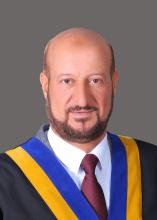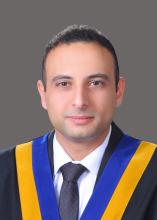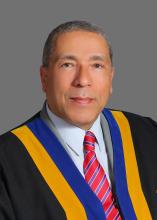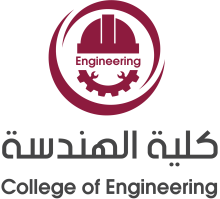In alignment with the vision and mission of the Amman Arab University, which encompasses the provision of outstanding higher education, and recognizing the limitations of conventional energy sources, the college of Engineering has taken steps to keep pace with scientific growth and contribute to find scientific and practical solutions. In this regard, the department of Renewable Energy Engineering was established in 2020.
The department awards a Bachelor's degree in Renewable Energy Engineering after successful completion of 162 credit hours. In general, the study plan focuses on renewable energy sources, energy conversion, transmission, storage, as well as energy economics and management. The program also includes the study of solar cell technology, wind energy systems, and various elective courses designed to enrich the student's knowledge in specialized topics related to sustainable energy technologies, including bioenergy and fuel cells, with a particular emphasis on renewable energy system design.
To enhance the theoretical knowledge acquired by students, the department is equipped with a range of specialized engineering laboratories furnished with high-specification devices and tools. This ensures that students will have the opportunities for hands-on practical application that align with the latest developments in the job market.
The college members in the Renewable Energy Engineering Department consists of a group of experienced academics with extensive expertise in various scientific fields. The aim is to provide a collaborative learning environment that fosters teamwork, enabling the graduation of specialized engineers in renewable energy engineering who are capable of meeting the demands of the job market in the renewable energy sector or pursuing further studies in this field at the graduate level.
Dr. Akram Musa
Acting Head of Renewable Energy Engineering Department
About the Bachelor of Renewable Energy Engineering
Jordan has one of the highest levels of reliance on foreign energy sources in the world, with 96% of the country's energy needs met by imported oil and natural gas from neighboring Middle Eastern countries. Jordan's GDP is greatly affected by its reliance on foreign oil imports. This motivated the country to invest in renewable energy to satisfy the country's energy needs.
Renewable energy is energy produced from non-depletable sources like the sun, wind, ocean, geothermal, etc... Renewable energy can be used for electricity generation, space and water heating and cooling, transportation, etc ...
As a result, Amman Arab University established this one-of-a-kind Department to meet the urgent need for graduates who are skilled in renewable energy engineering. The type of education provided by this Department distinguishes it from other departments in Jordan and the region.
The energy engineering study program provides students with the opportunity to gain comprehensive skills for jobs that require expertise in energy technology throughout all sectors of society.
Whereas renewable energy is a broad field, graduate students can work in both the public and private sectors as supervising engineers, design managers, executive or supervising engineers, or specialized researchers in the following positions:
- Renewable energy and fossil fuel power plants.
- Renewable energy companies.
- Ministries and municipalities.
- Electricity distribution firms.
- Energy project management companies.
- Central labs for renewable energy companies.
- Marketing and sales.
Finally, the department is equipped with the modern laboratories required to prepare the student in a distinguished manner so that he can acquire the necessary field experiences.
Vision:
Entrepreneurship and distinction in renewable energy engineering in teaching, research and application locally and regionally.
Mission:
Preparing and employing staff of engineers who are able to compete in the labor market with high professionalism, supported by the skills, knowledge and ethics of the profession in achieving comprehensive and sustainable development.
Renewable Energy Engineering Major Bachelor’s Program
Program Mission:
Providing distinguished academic programs in the field of renewable energy engineering supported by the knowledge, skills and ethics of the profession through qualified cadres capable of keeping pace with local and international standards in accordance with the e-learning integration standards.
Educational Program Objectives:
Take on significant positions within the renewable energy sectors, both on a local and global scale, with a firm commitment to improving society. This commitment should be accompanied by a thorough understanding of professional and ethical engineering principles, as well as a dedication to community service.
Display adeptness in communication by expressing ideas and concepts concisely, with a proven record of delivering compelling presentations to sizeable audiences.
Exhibit a commitment to ongoing professional development, essential for securing initial employment opportunities and achieving a thriving career trajectory that adapts successfully to all technological advancements.
Work jointly with academic institutions to carry out advanced scientific research, leading to innovative discoveries that help tackle intricate engineering problems, while being proficient in working collaboratively within cross-functional teams.
Educational Program Outcomes:
The expected outcomes of this program are preparing graduates competent in:
- An ability to identify, formulate, and solve complex engineering problems by applying principles of engineering, science, and mathematics.
- An ability to apply engineering design to produce solutions that meet specified needs with consideration of public health, safety, and welfare, as well as global, cultural, social, environmental, and economic factors.
- An ability to communicate effectively with a range of audiences.
- An ability to recognize ethical and professional responsibilities in engineering situations and make informed judgments, which must consider the impact of engineering solutions in global, economic, environmental, and societal contexts.
- An ability to function effectively on a team whose members together provide leadership, create a collaborative and inclusive environment, establish goals, plan tasks, and meet objectives.
- An ability to develop and conduct appropriate experimentation, analyze and interpret data, and use engineering judgment to draw conclusions.
- An ability to acquire and apply new knowledge as needed, using appropriate learning strategies.
Mapping of Program Educational Objectives (PEO's) with Students Outcomes (SO's)
Program Educational Objectives (PEOs)
- Our graduates will be qualified in renewable energy engineering who meet Jordan Energy Strategy 2020 – 2030 and energy regulatory framework updates, and regional industry requirements in terms of communication skills, ability to work well in teams, and use modern engineering tools.
- Engineers who practice design skills, analysis, formulate problem statements, and to estimate and perform engineering problem solutions.
- Engineers who enroll in progress professional development, updating and adapting their knowledge, and gaining new knowledge and skills to meet the requirements of the change in technology requirements and pursue new profession opportunities.
- Engineers who demonstrate the commitment and understand the responsibilities to professional and ethical standards of engineering.
Students Outcomes (SOs)
- An ability to identify, formulate, and solve complex engineering problems by applying principles of engineering, science, and mathematics.
- An ability to apply engineering design to produce solutions that meet specified needs with consideration of public health, safety, and welfare, as well as global, cultural, social, environmental, and economic factors.
- An ability to communicate effectively with a range of audiences.
- An ability to recognize ethical and professional responsibilities in engineering situations and make informed judgments, which must consider the impact of engineering solutions in global, economic, environmental, and societal contexts.
- An ability to function effectively on a team whose members together provide leadership, create a collaborative and inclusive environment, establish goals, plan tasks, and meet objectives.
- An ability to develop and conduct appropriate experimentation, analyze and interpret data, and use engineering judgment to draw conclusions.
- An ability to acquire and apply new knowledge as needed, using appropriate learning strategies.
Mapping between PEOs and SOs:
| PEOs | SOs |
| PEO1 | 1,2,7 |
| PEO2 | 2,3,4,6 |
| PEO3 | 1,2,6,7 |
| PEO4 | 3,4,7 |



| Major | Credit Hours | Study Plan |
| Renewable Energy Engineering | 162 |
| Number | List of Research Papers | Abstract |
| 1 | A.K. Handam, (2011), Estimation Renewable Energy Resource in Jordan, National Research university "Moscow Power engineering Institute". | Download |
| 2 | A.K. Handam, (2011), Climatic Characteristics Of Jordanian Regions And Its Territory Zoning For Estimation Of A Potential Of Renewable Energy Sources, Journal of ME | Download |
| Number | List of Research Papers | Abstract |
| 1 | Sol-Carolina Costa, Khamid Mahkamov, Murat Kenisarin, Mohammad Ismail, Elvedin Halimic, David Mullen, Kevin Lynn, Thomas Werner, (2018), Experimental and numerical study on melting of solar salt in a finned metallic container, ASME International Mechanical Engineering Congress and Exposition. | Download |
| Number | List of Research Papers | Abstract |
| 1 | A Lotfy, E Mohamed, AK Handam, BR Yu, (2020), Investigation of Polymer-70% Aluminum Powder Composite, Metall Met Phys. | Download |
| Number | List of Research Papers | Abstract |
| 1 | Mohammad Ismail, Awni H Alkhazaleh, Jafar Masri, Abdullah Masoud Ali, Malek Ali, (2021), Experimental and Numerical Analysis of Paraffin Waxes during Solidification inside Spherical Capsules, Journal Thermal Science and Engineering Progress. | Download |







